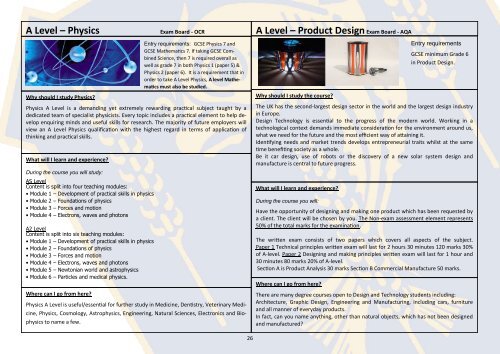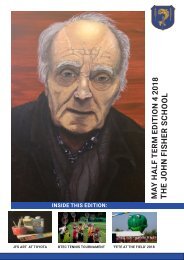Prospectus 2020-2022
The sixth form prospectus for students looking to join an Ofsted 'Outstanding' provision with a national reputation for academic success (top 17% for progress) sporting success (nationally recognised for rugby and cross-country) and cultural excellence through music and art.
The sixth form prospectus for students looking to join an Ofsted 'Outstanding' provision with a national reputation for academic success (top 17% for progress) sporting success (nationally recognised for rugby and cross-country) and cultural excellence through music and art.
Create successful ePaper yourself
Turn your PDF publications into a flip-book with our unique Google optimized e-Paper software.
A Level – Physics<br />
Exam Board - OCR<br />
A Level – Product Design Exam Board - AQA<br />
Why should I study Physics?<br />
Physics A Level is a demanding yet extremely rewarding practical subject taught by a<br />
dedicated team of specialist physicists. Every topic includes a practical element to help develop<br />
enquiring minds and useful skills for research. The majority of future employers will<br />
view an A Level Physics qualification with the highest regard in terms of application of<br />
thinking and practical skills.<br />
What will I learn and experience?<br />
During the course you will study:<br />
AS Level<br />
Content is split into four teaching modules:<br />
• Module 1 – Development of practical skills in physics<br />
• Module 2 – Foundations of physics<br />
• Module 3 – Forces and motion<br />
• Module 4 – Electrons, waves and photons<br />
A2 Level<br />
Content is split into six teaching modules:<br />
• Module 1 – Development of practical skills in physics<br />
• Module 2 – Foundations of physics<br />
• Module 3 – Forces and motion<br />
• Module 4 – Electrons, waves and photons<br />
• Module 5 – Newtonian world and astrophysics<br />
• Module 6 – Particles and medical physics.<br />
Where can I go from here?<br />
Physics A Level is useful/essential for further study in Medicine, Dentistry, Veterinary Medicine,<br />
Physics, Cosmology, Astrophysics, Engineering, Natural Sciences, Electronics and Biophysics<br />
to name a few.<br />
Entry requirements: GCSE Physics 7 and<br />
GCSE Mathematics 7. If taking GCSE Combined<br />
Science, then 7 is required overall as<br />
well as grade 7 in both Physics 1 (paper 5) &<br />
Physics 2 (paper 6). It is a requirement that in<br />
order to take A Level Physics, A level Mathematics<br />
must also be studied.<br />
Why should I study the course?<br />
The UK has the second-largest design sector in the world and the largest design industry<br />
in Europe.<br />
Design Technology is essential to the progress of the modern world. Working in a<br />
technological context demands immediate consideration for the environment around us,<br />
what we need for the future and the most efficient way of attaining it.<br />
Identifying needs and market trends develops entrepreneurial traits whilst at the same<br />
time benefiting society as a whole.<br />
Be it car design, use of robots or the discovery of a new solar system design and<br />
manufacture is central to future progress.<br />
What will I learn and experience?<br />
During the course you will:<br />
Have the opportunity of designing and making one product which has been requested by<br />
a client. The client will be chosen by you. The Non-exam assessment element represents<br />
50% of the total marks for the examination.<br />
The written exam consists of two papers which covers all aspects of the subject.<br />
Paper 1 Technical principles written exam will last for 2 hours 30 minutes 120 marks 30%<br />
of A-level. Paper 2 Designing and making principles written exam will last for 1 hour and<br />
30 minutes 80 marks 20% of A-level.<br />
Section A is Product Analysis 30 marks Section B Commercial Manufacture 50 marks.<br />
Where can I go from here?<br />
Entry requirements<br />
GCSE minimum Grade 6<br />
in Product Design.<br />
There are many degree courses open to Design and Technology students including:<br />
Architecture, Graphic Design, Engineering and Manufacturing, including cars, furniture<br />
and all manner of everyday products.<br />
In fact, can you name anything, other than natural objects, which has not been designed<br />
and manufactured?<br />
26
















